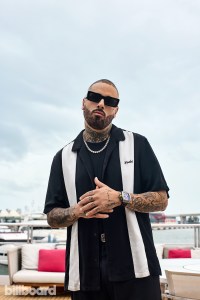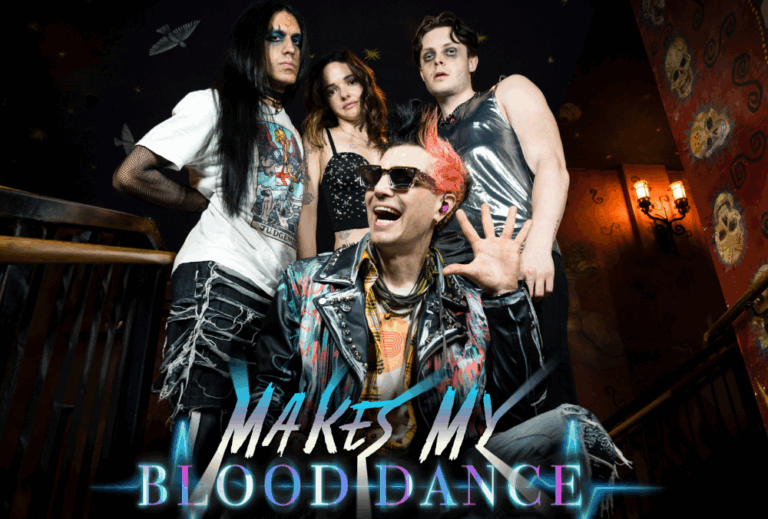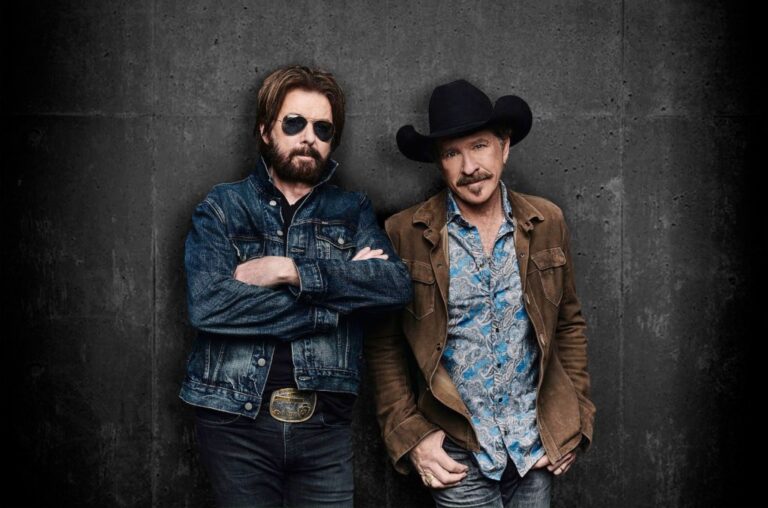On a balmy May evening in 2023, the Glasshouse — a neon-lit venue six stories above the Hudson River in Manhattan’s Hell’s Kitchen neighborhood — buzzed with excitement. A music-industry crowd of hundreds had gathered for a private Telemundo Upfront event and its featured performance by Nicky Jam. And from the moment the seminal reggaetón star stepped onstage, clad in his signature baseball cap and an athletic Amiri ensemble beneath a wool trench coat, he showcased why he’s not just part of the genre’s history but also a vital architect of its present and future.
As Nicky sang 2003’s “Yo No Soy Tu Marido,” a bold attendee leapt onstage to dance alongside him. “Oh, ella quiere perrear!” (“She wants to twerk!”) he exclaimed, happily engaging with his unexpected partner as she enthusiastically began to grind on him. For about two hours, Nicky commanded the spotlight with that kind of effortless swagger, cycling through his expansive catalog of hits, from his 2014 international breakout smash, “Travesuras,” to the pulsating beats of “Hasta El Amanecer,” to the pop-reggaetón banger “El Perdón,” to the groundbreaking collaborative track “Te Boté (Remix).”
Trending on Billboard
Two decades into his career, Nicky is still vital onstage — which made it all the more shocking when, last October, he told his more than 40 million Instagram followers that he was “retiring soon.” He paired his social media announcement with footage from his 2018 Netflix bio-series, Nicky Jam: El Ganador, which chronicled how he’d recovered from a turbulent past marked by drug addiction (and a stint in prison) to become one of Latin music’s most illustrious figures. “I’m not going to be a singer for the rest of my life,” he tells Billboard today over Zoom from his Miami home. “I think I’ll probably retire soon… Well, not retire. Singers never retire. You just tone it down.”
Nicky Jam will headline Rumbazo on Sept. 13 at the Downtown Las Vegas Events Center. For more information, go to rumbazofest.com.
Offstage, the 43-year-old born Nick Rivera Caminero certainly doesn’t look like he’s slowing down. He’s channeled his creativity into a burgeoning business empire, running a chic Miami restaurant, La Industria Bakery & Cafe, and a few boutique hotels in Colombian cities including Cartagena, Guatapé and Medellín. “I have another hotel in Tierra Bomba that we’re almost finishing. It’s on an island resort [in Colombia] that I bought,” he mentions casually, then adds with a grin: “I’ll probably come out with weed too.”
In addition to these ventures, he’s recently launched his own lines of vape products (NickyJam x fume) and energy drinks (Athon) and even dipped his toes into the media world as host of The Rockstar Show (which streams on his official YouTube channel as well as all podcast platforms), where he’s interviewed Latin music stars including Karol G, Rauw Alejandro and Tainy (not to mention Billboard’s own chief content officer of Latin/Español, Leila Cobo). “We’re coming out with the third season right now,” Nicky says. And he also just signed his first full management client, up-and-coming Bronx rapper Axel Leon. (Nicky is also part of the management team for Manuel Turizo.)
However, for the moment, Nicky continues to find music creatively fruitful. The artist has been open about his battles with addiction, but when speaking with Billboard, he also reveals that he’s grappled with anxiety and depression for the past two years. That emotional turbulence — and the sleepless nights that came with it — inspired his sixth studio album, one of his most personal to date. Insomnio, out Sept. 6, delves into his personal reflections and nocturnal musings, while musically blending the sounds of Afrobeats, soul, trap and reggaetón.
For the project, he enlisted a range of talent from all over the world including Jamaican dancehall veteran Sean Paul, Puerto Rican trap star Eladio Carrión, Italian DJ-producer Benny Benassi, Argentine rapper Trueno and Colombian reggaetón star Ryan Castro. “It’s crazy to collaborate with a person you grew up listening to on the stoops of your neighborhood, the cars blasting his music in your city,” says Trueno, who guests on the classically reggaetón single “Cangrinaje.” “It’s like being able to transcend the line from being an admirer to being able to collaborate with that influence. Nicky Jam, without a doubt, was one of those visions that has stayed with me.”
“Having a track with Nicky for his latest album is very special to me because I watched him perform in nightclubs in Medellín,” says Castro, who’s listened to Nicky since he was a kid. “Seeing him overcome everything he went through in life and achieve what he has is the ultimate inspiration for me. Nicky is a star, and since I met him, we’ve developed a great friendship. I feel like he’s one of our own in Colombia.”
KSUBI shirt, Amiri pants and Louis Vuitton glasses.
Devin Christopher
Before his resurgence in the mid-2000s, however, Nicky faced significant struggles on his native island. “In Puerto Rico, I wasn’t booking any shows. Nobody wanted to deal with me — I had a bunch of problems on the streets, I was into drugs, I was a mess. Back in Puerto Rico at that time, I was the embarrassment of reggaetón music,” Nicky told the podcast Drink Champs last year. “But in Colombia, I was a legend,” he added, noting that Colombians appreciated both his hits and the songs that weren’t popular back home.
When Nicky moved to Colombia in 2007, he experienced a rebirth. “He arrives from Puerto Rico to Colombia con una mano atrás y otra adelante,” says his longtime manager Juan Diego Medina, using the Colombian expression for arriving with nothing. “In Colombia, he went through an entire musical process. He says that he learned to be human there, in the city [of Medellín] and country.” (In July, the two amicably parted ways after 13 years but remain close friends.)
“Moving to Colombia gave me the mojo to do the music,” Nicky says. “I got to Colombia in a moment when I desperately needed to work. They were listening to my old songs; they said they were classics. It changed my way of thinking and my way of writing music. I just sat down and I said, ‘If I make a No. 1 hit in this country, that would mean a lot of views on YouTube.’ With 45 million people [back then in Colombia], I was motivated. So I did a No. 1 national hit in Colombia, then four, five more. I became the new Colombian sound.”
In Colombia, Nicky embraced local culture while leveraging then-emerging digital platforms to reach a wider audience. “He had his whole trajectory in Puerto Rico and went to Colombia to try to reinvent himself, to find that audience that would give him a second opportunity,” says Stephanie Carvajal, artist relations and development, Latin lead at YouTube. “What allowed him to break beyond was a platform like YouTube. Nicky Jam was one of the pioneers in understanding and harnessing the power of YouTube to extend his music to audiences worldwide.”
Released in February 2015, “El Perdón,” Nicky’s game-changing collaboration with Enrique Iglesias, was a pivotal moment in reggaetón’s evolution from crude barrio genre to global juggernaut. “Nicky Jam was blowing up in Colombia, and Enrique had just put out ‘Bailando,’ ” recalls industry veteran Gerardo Mejía, who had worked closely with the Spanish pop superstar at Interscope Records and remained in close contact with him. “I said to Enrique, ‘Bro, you got to do something with Nicky.’ Nicky sent us ‘El Perdón.’ I said, ‘Wow, this is a hit.’ We saw how the [reggaetón] crossover began to happen through Enrique’s pop strength. All reggaetón started becoming more [mainstream] — it wasn’t so street anymore.”
But Iglesias’ pop-oriented style initially gave Nicky pause when he first heard it. “I felt the song was too pop-ish,” he admits. “I was worried about my street community. My urban community. I thought they were going to criticize me, so I put out the song without him. Then the record label, Sony, was like, ‘Yo, bro, we need you to put Enrique back on that track because it will be the best move you would do.’ We did the video and the version with Enrique, and that became a global hit.”

Louis Vuitton glasses, Gucci belt, Amiri pants and Palm Angels shoes.
Devin Christopher
Almost a decade later, Nicky Jam is one of YouTube’s most watched Latin artists of all time, boasting seven videos in the platform’s Billion Views Club. On the Billboard charts, “El Perdón” began a run of nine entries on the Hot 100 for him, and two of his albums, 2017’s Fénix and 2019’s Intimo, charted on the Billboard 200.
His Insomnio singles have also fared well: The 2023 Feid collaboration “69” climbed to No. 41 on Hot Latin Songs, No. 37 on Latin Airplay, No. 18 on Latin Digital Song Sales and No. 10 on Latin Rhythm Airplay; “Calor,” with Beéle, reached No. 20 on Latin Airplay and No. 6 on Latin Rhythm Airplay; and the title track, released in August, soared to No. 9 on Tropical Airplay.
And as he prepares for Insomnio’s release and contemplates what might come after, Nicky is well aware of his influence. “I came out exactly at that moment where everything happened,” he says. “For some weird reason, me being an old-school singer, I started what’s going on right now. I’m lucky to say I’m from the old school. I did a lot of hits back in the days, but when it came to the new stuff and the new movement, I’m one of the creators and pioneers of that moment, too.”
Insomnio is an evocative title. What inspired it, and how does it relate to the music’s themes?
I’ve been having two crazy years. I was struggling with anxiety and depression. A lot of the problems from the past were catching up to me. It led me to drink a lot. I had problems with drugs in the past, but never with alcohol. Alcohol is something legal that you find anywhere you go. I started drinking a lot, and it took me to a dark spot where I was feeling like it wasn’t the Nicky people are used to. I was partying too much, going out and I wasn’t sleeping. The crazy thing is sometimes, out of bad things, good things come. I did badass songs for this album during this dark moment. The reason why the album is called Insomnio is because most of the songs [were written, recorded and] take place at night.
How did the nocturnal songwriting process influence the album’s overall tone and message?
Remember, music is the art of expression, and I’m expressing myself. I’ve always been that type of person who’s very transparent. I never hide who I am or what I do. If you listen to “3 a.m. y yo en la cyber truck, pensando cuando contigo me daba los shot” [from “La Cyber” featuring Luar La L], “Exótica” [with lyrics] like “ver el sol caer,” most of the songs talk about me in full self-destruction mode, partying and not giving a f–k about life and just going crazy. If you listen to “Insomnio,” the merengue song, it’s a very sad song [lyrically].
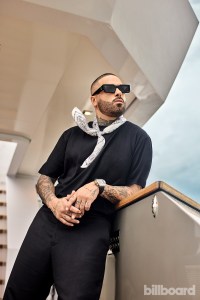
Louis Vuitton glasses, Gucci belt, Amiri pants.
Devin Christopher
Merengue is usually joyful, but “Insomnio” takes a darker turn. How did you balance its upbeat rhythm with its somber themes?
If you listen to “El Perdón,” it’s a sad song. But you put that beat [on it], it automatically becomes a happy song. I think that’s part of my magic. I can make a sad song sound happy. That’s part of my creation mode. I really like that people can sing a sad song not even known as a sad song. That’s magic! If I were to sing that with low, dark chords, you automatically would have been like, “Damn, this motherf–ker is sad as f–k.” The reality is I was sad when I wrote that song, but in the production moment, I said, “I am not going to make this a sad song, I want this upbeat.”
Every album has its own unique creation journey. How would you differentiate Insomnio from Infinity, Intimo or Fénix in terms of the creative process?
I’m going to be honest with you. Fénix is an album that you can realize is Nicky Jam in his prime, doing his comeback and very happy about life. It was a different moment in my life. These other two albums, it was just working. I was touring so much and I just did music and put the [album] name after. These other two albums have no meaning for me. Insomnio has more meaning than any of these albums because I’m telling the people how I felt in one of my darkest moments.
On Insomnio, you navigate between trap, merengue, reggaetón, Afrobeats and electronic music. Can you talk about exploring a wide spectrum of genres?
I’m not this guy that stays in one corner. I could sing R&B, hip-hop, trap, reggaetón, merengue, whatever. The merengue thing is something I’ve never done. That’s why I wanted to do it. That’s funny because I’m half Dominican. Merengue right now is doing really good. Karol G came out with a merengue, Manuel Turizo, and a couple of others. I wanted a part of it. But the whole trap song thing was because Eladio Carrión sent me the [beat]. Then the Afrobeats is something that’s really going on right now. Quería cubrir todas las partes — I wanted to have every corner block. That’s what I did with the album.
Alongside your music, you’ve ventured into business, investing and launching restaurants and hotels. How do these fit into your long-term plans?
I’m not going to be a singer the rest of my life. I’m 43 years old. In a [few] years, I’ll be 50. A 50-year-old reggaetón artist; I don’t know if that looks so good. Daddy Yankee retired at 47, 48. I think I’ll probably retire soon, too. Not now, but probably in seven to 10 years. Well, not retire. The word “retire” for a singer does not make any sense. Daddy Yankee said he retired, and he came out with a song [“Loveo”] a couple of months ago.
There are a lot of new kids, and you’re not going to compete when you’re almost 50 with a 20-year-old that has that brand-new sound, that new vibe that kids like. The reality is this is young people’s music. I’m not saying older people don’t listen to it, but if you see the list of the people, you’re going to see that it’s mostly the youth that listen to this music. You can’t compete with that. So I prepared myself businesswise.
When people say, “OK, Nicky, you’re too old for this,” I’ll be like, “All right, but I’m rich, baby. I got businesses that take care of me and [I] still live the lifestyle.” That’s what you want, to capitalize so many businesses that you don’t even have to perform and do music to live the lifestyle. I worked hard for it. That’s why I do businesses on the side, where I could profit enough that I can keep living that good life.
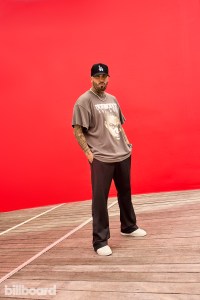
Faith by Luis hat.
Devin Christopher
How do your restaurant, La Industria Bakery & Café, and your hotels reflect your personal interests?
La Industria is mostly a brunch place. You get your pancakes and French toast. It’s that type of vibe. Here in Miami, I used to go to a lot of these spots, but I recognized there wasn’t a Spanish one. So I came out with the bakery, and it’s been a boon. It has my DNA everywhere. I was born and raised in Massachusetts, but I lived in Puerto Rico most of my life. At the end of the day, it’s a sweet pancake spot — but the bestseller is a hamburger called La Boricua. Everybody goes and gets that hamburger. They love it. You have a knife right through the middle.
You recently signed a management deal with hip-hop artist Axel Leon. What qualities do you look for in artists you mentor?
They got to be talented, disciplined, versatile and have a lot of charisma. That charisma goes crazy with the people. Just with that, you could conquer the world in the music industry. Talent is something, but if you have charisma and you’re hungry to work…
What led you to start The Rockstar Show?
I was in pandemic [mode]. Bored. I wasn’t doing anything. I was in my house and I said, “I got to work.” So I got a studio and I started interviewing artists. It started with a couple of interviews. From there, we went to The Rockstar Show. We’re coming out with the third season right now.
You took The Rockstar Show to Billboard Latin Music Week in 2023, and during your onstage interview with Ivy Queen you started beatboxing. What was that about?
I’m from the old school. Back in the day, we were MCs and we did everything. We’d rap, beatbox and dance. I used to breakdance. I used to [freestyle] battle in the corners like they do in the Red Bull Batalla. I’m very good. Believe me, ain’t nobody f–king with me.
As you continue diversifying your career, are there any other new avenues you’re looking to still explore?
Mostly hospitality, hotels. That’s what I’m really doing. I’ve done acting [in movies like 2017’s xXx: Return of Xander Cage and 2020’s Bad Boys for Life], I’ve done music, I’ve done it all.
Everything I do is to inspire people. Yes, it’s business, but at the end of the day, I come from a black hole most people don’t come out of. A lot of people that were raised with me, they’re dead right now. I’m not talking about one or two, I’m talking about hundreds of them. There’s a chance. There’s hope. If I did it, you could do it. That’s my philosophy.
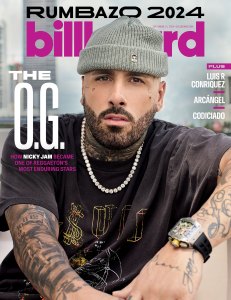
This story appears in Billboard‘s Rumbazo special issue, dated Sept. 14, 2024.

